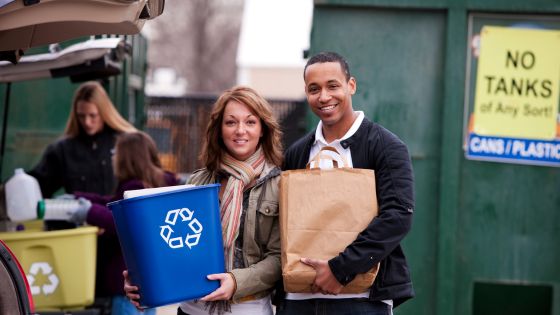In a world grappling with environmental degradation, the need for sustainable solutions has become increasingly urgent. Recycling centers serve as crucial pillars in the fight against environmental deterioration.


Adopting green recycling practices can not only minimize waste accumulation but also preserve our natural resources. This comprehensive guide explores the concept of green recycling, its benefits, and how these centers actively contribute to a greener future.
Green Recycling Unveiled
Green recycling refers to the process of converting waste materials into reusable products while minimizing environmental impact. Unlike traditional recycling methods, it goes beyond mere material separation.
Green recycling emphasizes the use of energy-efficient techniques, eco-friendly materials, and waste-reduction strategies. Implementing these practices allows us to effectively tackle the growing waste problem and safeguard our planet.
What Are Its Benefits?
1. Protecting Natural Resources
Recycling centers play a vital role in conserving our planet’s precious resources. Through systematic waste management and the reuse of materials, the demand for raw material extraction, such as mining or deforestation, significantly decreases.
For example, recycling paper reduces the need for timber. This helps protect forests and the biodiversity they support.
2. Saving Energy
Green recycling promotes energy conservation by utilizing recycled materials instead of processing new ones. The production of recycled materials requires significantly less energy compared to manufacturing new products from scratch.
For instance, recycling aluminum consumes only about 5% of the energy required for virgin aluminum production. So, when we opt for green recycling, we can minimize our carbon footprint and mitigate the effects of climate change.
3. Cutting Waste
One of the primary advantages of recycling facilities is the reduction of waste sent to landfills or incinerators. Diverting materials through recycling helps decrease the amount of waste that ends up at disposal sites.
This waste often contributes to pollution and environmental degradation. Green recycling gives these materials a new lease on life, which effectively minimizes the need for landfills and reduces greenhouse gas emissions.
4. Creating Green Jobs
Recycling stations and associated initiatives generate employment opportunities in various sectors. Jobs are created in waste management and recycling facilities and manufacturing plants that use recycled materials. These green jobs not only support local economies but also promote sustainable practices.
5. Reducing Pollution
Green recycling substantially curbs pollution levels linked to waste disposal methods. Landfills and incinerators release harmful gases, leachate, and toxic residues that contaminate soil, water, and air. By diverting waste through recycling stations, we can foster a healthier environment for all living beings.
The Multifaceted Contributions of Recycling Centers
Recycling stations form the backbone of the green recycling movement, enabling the effective management of recycling processes. They provide a centralized location for the collection, sorting, processing, and distribution of recyclable materials. Here are some key ways in which recycling facilities help build a sustainable future:
1. Efficient Waste Management
Recycling stations serve as hubs for efficiently managing waste. They ensure proper segregation of materials, maximizing the potential for recycling and minimizing contamination. Implementing effective systems for waste management streamlines the recycling process and reduces inefficiencies.
2. Accessible Recycling Facilities
These centers make recycling more accessible to the community. They provide convenient drop-off points for recyclable materials, making it easier for people and businesses to participate in recycling efforts. Promoting accessibility lets recycling facilities encourage greater participation and increase recycling rates.
3. Technological Advancements
These centers stay at the forefront of technological advancements in recycling processes. They continually invest in new equipment and technologies that enhance recycling efficiency, increase the range of materials that can be recycled, optimize resource utilization, and promote sustainability.
4. Fostering Environmental Consciousness
Recycling centers play a vital role in educating the community about the importance of recycling and sustainable waste management practices. They organize awareness campaigns, workshops, and educational programs to inform individuals about the benefits of recycling and how to properly participate.
5. Collaboration and Partnerships
Recycling stations foster collaboration between various stakeholders, including individuals, businesses, and local governments. They form partnerships with businesses to facilitate the recycling of commercial waste.
They also work closely with local authorities to ensure compliance with recycling regulations. Through these forged collaborations, these centers create a network of support that accelerates the transition to a sustainable future.
Take Action Today for a Greener Tomorrow
By supporting recycling centers and actively participating in recycling efforts, individuals and communities can make a significant impact on creating a greener and more sustainable world. Let us embrace the power of recycling and inspire others to join us on this transformative journey.








